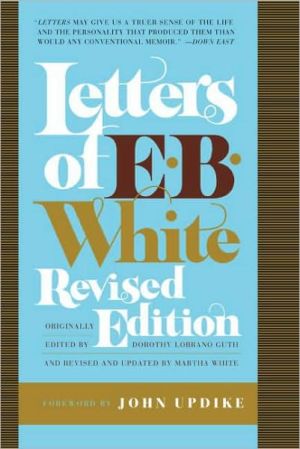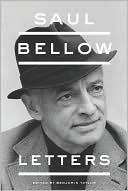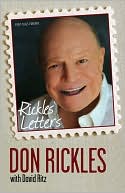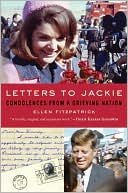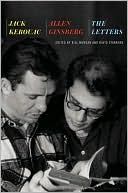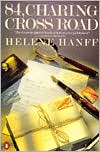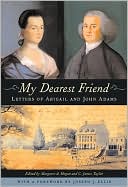Letters of E. B. White
Letters of E. B. White touches on a wide variety of subjects, including the New Yorker editor who became the author's wife; their dachshund, Fred, with his "look of fake respectability"; and White's contemporaries, from Harold Ross and James Thurber to Groucho Marx and John Updike and, later, Senator Edmund S. Muskie and Garrison Keillor. Updated with newly released letters from 1976 to 1985, additional photographs, and a new foreword by John Updike, this unparalleled collection of letters...
Search in google:
Letters of E. B. White touches on a wide variety of subjects, including the New Yorker editor who became the author's wife; their dachshund, Fred, with his "look of fake respectability"; and White's contemporaries, from Harold Ross and James Thurber to Groucho Marx and John Updike and, later, Senator Edmund S. Muskie and Garrison Keillor. Updated with newly released letters from 1976 to 1985, additional photographs, and a new foreword by John Updike, this unparalleled collection of letters from one of America's favorite essayists, poets, and storytellers now spans nearly a century, from 1908 to 1985.The Barnes & Noble ReviewE. B. White's place in 20th-century American literature is impossible to classify. You would want to call him a man of letters, but then you notice that he didn't write about books or culture or ideas or anything remotely intellectual. As a prolific contributor to The New Yorker's "Notes and Comments" department, he was master of the occasional sketch or feuilleton (a term he would never use). He was also a virtuoso of the elegiac personal essay and a dab hand at comic verse, gentle poems, and droll little stories and parodies. His three children's books still cover the land, and he contributed the third element to the writer's trinity of necessary volumes: dictionary, thesaurus, and "Strunk and White." He also wrote hundreds of letters. Indeed, this volume, revised to include letters written in the last decade of his life and now available in paperback, belongs as much to his life's work as anything he ever wrote.
Letters of E. B. White, Revised Edition\ \ By E. B. White \ HarperCollins\ Copyright © 2006 E. B. White\ All right reserved.\ ISBN: 0-06-075708-6 \ \ \ Chapter One\ Mount Vernon 1908-1917 \ (Elwyn Brooks White was born in Mount Vernon, New York, on July 11, 1899, the youngest of the six children of Samuel and Jessie Hart White. Mount Vernon was a quiet, leafy suburb in the early years of the new century, and Elwyn, sometimes called "En," grew up in a child's paradise of backyards and skating ponds, bicycles and pets. He attended public schools, where he got good grades, and he did some writing for the Oracle, the high school paper. White himself can best supply the details and introduce the characters, and the following introduction is, therefore, in his own words.-Ed.)\ If an unhappy childhood is indispensable for a writer, I am ill-equipped: I missed out on all that and was neither deprived nor unloved. It would be inaccurate, however, to say that my childhood was untroubled. The normal fears and worries of every child were in me developed to a high degree; every day was an awesome prospect. I was uneasy about practically everything: the uncertainty of the future, the dark of the attic, the panoply and discipline of school, the transitoriness of life, the mystery of the church and of God, the frailty of the body, the sadness of afternoon, the shadow of sex, the distant challenge of love and marriage, the far-off problem of a livelihood. I brooded about them all, lived with them day by day. Being the youngest in a largefamily, I was usually in a crowd but often felt lonely and removed. I took to writing early, to assuage my uneasiness and collect my thoughts, and I was a busy writer long before I went into long pants.\ Our big house at 101 Summit Avenue was my castle. From it I emerged to do battle, and into it I retreated when I was frightened or in trouble. The house even had the appearance of a fortress, with its octagonal tower room for sighting the enemy and its second-story porches for gun emplacements. Just inside the massive front door was the oak hatrack, next to the umbrella stand. On the left the parlor, where the action was; on the right the "reception room," where no one was ever received but where I found my mother one day stretched out on the settee, recovering from an accident with a runaway horse. I thought she was dead.\ I remember the cellar, its darkness and dampness, its set tubs, its Early American water closet for the help, its coal furnace that often tried to asphyxiate us all, and the early sound of the Italian furnace man who crept in at dawn and shook the thing down. As a very small boy, I used to repair to the cellar, where I would pee in the coal bin-for variety. Out back was the stable, where I spent countless hours hobnobbing with James Bridges, the coachman, watching him polish harness and wash carriages.\ My father, Samuel Tilly White, was born in Brooklyn, the son of a carpenter and the grandson of a contractor. I don't know a great deal about my father's upbringing and home life. I don't think there was much money there, and there may have been some rough times. My father was, all his life, a sober and abstemious man, but I'm not sure his father was. His mother, Mary Ann Elizabeth Tilly, was an admirable woman. She came of "landed Gentry" in England but was deprived of her share of her father's estate because she married a tradesman. At any rate, young Samuel, my father (he always wrote his name "Sam'l"), felt obliged to quit school at thirteen and go to work. He found a job as "bundle boy" (wrapping packages) with the piano firm of Horace Waters & Company, at 134 Fifth Avenue, Manhattan. This company had a factory in Harlem, where the cases for uprights, squares, and baby grands were manufactured by a crew of beer-drinking Germans, skilled artisans. The actions (keyboard, hammers, dampers, etc.) were bought from a company that specialized in that and were installed at the Horace Waters factory.\ Sam White not only wrapped bundles for his employer, he began pulling at his own bootstraps. He informed himself about every aspect of the business, learned bookkeeping, learned to play the piano, kept his eyes and ears open, and was soon climbing life's ladder. He was successively a clerk, a salesman, a branch manager (there were two or three retail stores scattered about the city), an officer of the company, finally president. When I was a child, I used to watch parades from a front-row seat next to the big plate glass window on the second floor of 134 Fifth Avenue-a splendid vantage point. I was "Mr. White's boy," marked for the special treatment. I made many visits to 134 and remember particularly the wonderful sad sound of a piano being tuned somewhere in the building.\ Old Horace Waters, who founded the company, was an active temperance man. This may have had some effect on Father's life-I don't know. I do know that he spent most of his life as a teetotaler; only near the end did he occasionally treat himself to a glass of wine. He was a man of great probity, scrupulously honest and fair, a wing-collar, starched-cuff man, whose speech was never blurred by obscenities or profanities. He had a sentimental turn of mind, which led him into songwriting, and two or three of his compositions were published in the form of sheet music. But essentially he was a man of affairs, of business. He was what we call "well to do," a moderately successful businessman who ran both his company and his private life with caution and thrift. Over the years he accumulated enough money to build a house in Mount Vernon in the district called Chester Hill, which was classy. I have no idea how he met Mother. Their backgrounds were quite different. Father was forty-five years old when I was born; Mother was forty-one. So my parents and I were separated by almost two generations. I never knew my grandparents-they were all either dead or dying when I came along.\ (Continues...)\ \ \ \ \ Excerpted from Letters of E. B. White, Revised Edition by E. B. White Copyright © 2006 by E. B. White . Excerpted by permission.\ All rights reserved. No part of this excerpt may be reproduced or reprinted without permission in writing from the publisher.\ Excerpts are provided by Dial-A-Book Inc. solely for the personal use of visitors to this web site. \ \
\ Library JournalIn the original edition of E.B. White's letters (edited by his goddaughter, Dorothy Lobrano Guth, and published in 1976), White noted in his introduction that "ideally, a collection of letters should be published posthumously"; as his new editor (his granddaughter, Martha White) notes, White "got his wish." This enjoyable collection by one of the English language's greatest writers has been reedited to reflect White's and his wife Katharine's deaths. Additionally, some of the previously selected letters have been removed. This was presumably done to make room for the two new chapters, "Goodbye to Katharine, 1977-1981" and "E.B. White, a Biography, 1982-1985," which cover the years between the original book's publication and White's death. These are interesting additions; however, it seems a shame that any of the original letters were cut. The new introduction by John Updike is also worth reading. Recommended for academic and public libraries, even those already owning the original edition. Felicity D. Walsh, Emory Univ., Decatur, GA Copyright 2006 Reed Business Information.\ \ \ The Barnes & Noble ReviewE. B. White's place in 20th-century American literature is impossible to classify. You would want to call him a man of letters, but then you notice that he didn't write about books or culture or ideas or anything remotely intellectual. As a prolific contributor to The New Yorker's "Notes and Comments" department, he was master of the occasional sketch or feuilleton (a term he would never use). He was also a virtuoso of the elegiac personal essay and a dab hand at comic verse, gentle poems, and droll little stories and parodies. His three children's books still cover the land, and he contributed the third element to the writer's trinity of necessary volumes: dictionary, thesaurus, and "Strunk and White." He also wrote hundreds of letters. Indeed, this volume, revised to include letters written in the last decade of his life and now available in paperback, belongs as much to his life's work as anything he ever wrote. \ The best letter writers are what, today, are unkindly called control freaks, but that was E. B. White to a tee. Face-to-face discussions, of large matters particularly, irked him. They were likely to range out of control, skitter off in all directions, and result in distressing muddles, not the least being inaccurately expressed declarations of feeling. A letter is different. There you're in charge, having your way and disarming your reader all at one go. "If this letter sounds peremptory or bossy," he wrote to one correspondent of whom he was asking a favor, "it is because I have just dined on wild meat."\ To this end, White habitually communicated with his wife, Katharine, by inter-office memo and letter even when they were separated by only a few steps. Among such letters is one notifying her shortly after their wedding that he is happy they are married, and a later one in which he writes to let her know that he is greatly moved that she is pregnant. This undertaking, however, was so formidable that he handed it over to their dog, Daisy: "White has been stewing around for two days now, a little bit worried because he is not sure that he has made you realize how glad he is...he gets thinking that nothing that he writes or says ever quite expresses his feeling, and he worries about his inarticulateness just the same as he does about his bowels, except it is worse, and makes him either mad, or sick, or with a prickly sensation in the head."\ White admitted to living in a state of chronic uneasiness. Writing about his encounters with the world, in which he combined precision and whimsy, not only brought him relief, but constituted his art. He had discovered, he wrote to his brother, that, "writing of the small things of the day, the trivial matters of the heart, the inconsequential but near things of this living was the only kind of creative work which I could accomplish with any sincerity or grace." We notice that, with characteristic meticulousness in describing his outlook, he does not speak of "life," but of "living." Life is alarmingly portentous, while living -- an assembly of little tasks and small happenings -- is possible for an uneasy man to take on and describe with some festivity. In writing of the quotidian, he continued, "I have occasionally had the exquisite thrill of putting my finger on a little capsule of truth, and heard it give the faint squeak of mortality under my pressure, an antic sound."\ These letters are filled with that antic sound, a source of endless joy to the reader, and never more so than when White is describing the goings-on at his saltwater farm in Maine and the ways of his animals. Among the actors are dogs ("Tunney, who is twelve and has the worst breath in Hancock County, is in love again, and goes sobbing all over the house, playing his violin"), chickens ("These birds of mine never stop shaking their heads and it is beginning to get to me. Sometimes I stand there and get thinking that maybe they are shaking their heads at me"), and geese ("Geese...are sagacious, contentious, storm-loving, and beautiful. They are natural hecklers, delight in arguing a point, and are possessed of a truly remarkable sense of ingratitude. They never fail to greet you on your arrival, and the greeting is tinged with distaste and sarcasm.... Their bowel activity is, of course, legendary").\ In his letters, as elsewhere, White was fond of impromptu generalizations about the world, fanciful maxims forged most often out of adversity, as when he broke his toe: a cane "gives dignity, direction, restraint, and a general sense of owning whatever you set the point of the cane down on." Or after his daughter-in-law's dog ends a visit: "The departure of a St. Bernard from a home is one of the finest things that can happen to the home."\ The letters range from 1908 to 1985, from when he was nine, and already a humorous fellow, to the year he died. Aside from any number of missives to Katharine recording his doings ("Wormed [the dog] Mose, and got eleven fine roundworms -- six inches long each"), the volume includes letters to members of his family, among which are comic tales of his road trip to the West Coast, meditations of how he means to live his life, and reports on his health ("Except for waves of nausea that glide through me on their little cat feet, I'm fine"). There are epistles of fantastic evasion to a longtime girlfriend, chatty ones to old college mates and friends, and many revealing and often severe dispatches to colleagues at The New Yorker, including editor Harold Ross ("I pull back like a mule at the slightest goading"). The most entertaining letters of all are to friends whose unbounded sense of humor he shares, James Thurber and Frank Sullivan among them. And throughout and to everyone he conveys a pleasure in manual labor and tinkering that is visceral, if not positively concupiscent. ("I have an entirely new feeling about life ever since making an ax handle").\ The death of Katharine in 1977 was a terrible thing, but his comic sensibility and humaneness survived. In the end, this book, with its humor, its celebration of nature and her busy, personable creatures, and its insistence on a modest human existence, is immeasurably heartening. Perhaps we can't say precisely where E. B. White fits in American literature, but his collected letters belong at every American bedside. --Katherine A. Powers\ Katherine A. Powers writes the literary column "A Reading Life" for the Boston Sunday Globe and lives in Cambridge, Massachusetts.\ \ \
